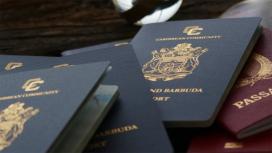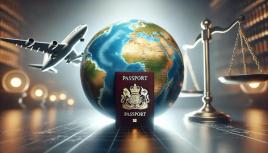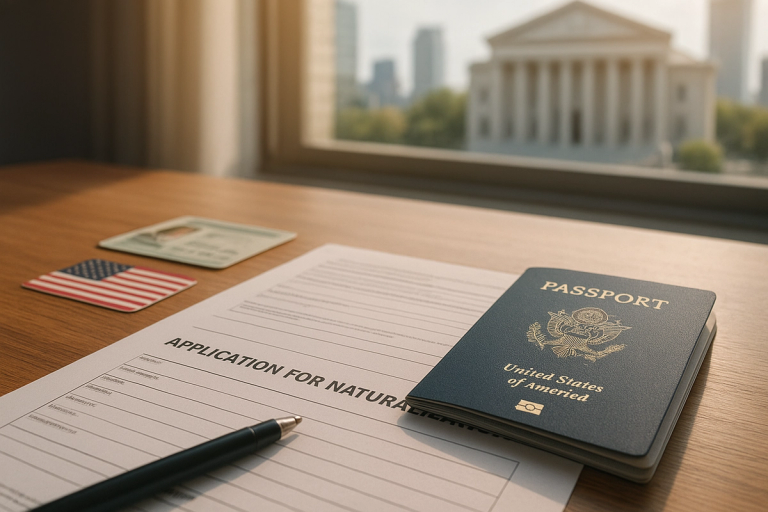Blog • Published on:October 22, 2025 | Updated on:October 22, 2025 • 18 Min
How to Get Citizenship by Naturalization in 2025
Citizenship by naturalization is the path for people who choose to build a real life in a new country, not just invest in it. It’s the reward for years of residency, integration, and contribution to a community that eventually becomes home.
In 2025, as more countries tighten their citizenship-by-investment frameworks and emphasize long-term residency, naturalization is becoming the primary route for those seeking stability, global access, and a lasting connection to their adopted home.
Understanding Citizenship by Naturalization
What is Naturalization?
Naturalization is the process through which a foreign resident becomes a full citizen of a country after meeting specific legal, cultural, and residency requirements.
It represents a formal acknowledgment that the individual has successfully integrated into their new community, both socially and economically, and is ready to assume the rights and duties of a citizen.
Typically, this includes maintaining lawful residency for several years, demonstrating language proficiency, and passing background or integration tests.
How Does Naturalization Differ from Other Citizenship Methods?
Naturalization differs from citizenship by investment or descent because it is earned over time, not acquired through immediate eligibility via capital contribution.
Here’s a quick comparison of the main routes to citizenship in 2025:
What Are the Benefits of Naturalized Citizenship?
Becoming a naturalized citizen grants the same rights and protections as those born in the country, often with no legal distinction. You gain:
- Full access to healthcare, education, and employment opportunities
- Permanent protection under national law
- The right to vote and participate in public life
- A secure base for your family’s future
- In many cases, a passport offering global mobility
Naturalization also reflects something deeper, a sense of belonging and recognition from the country you choose to call home.
Who Is Eligible for Citizenship by Naturalization?
What Are the Basic Eligibility Requirements?
Every country sets its own criteria for naturalization, but the foundation is the same everywhere: time, stability, and good conduct.
To qualify, applicants generally need to:
- Live legally in the country for a minimum number of years (often 5–10)
- Demonstrate good moral character and a clean criminal record
- Prove financial independence and tax compliance
- Show knowledge of the country’s language, laws, and customs
Some countries may also require proof of integration, such as community involvement, local employment, or family ties.
Does Eligibility Vary by Country?
Yes. Residency and integration standards differ widely depending on the country and region.
For instance:
- Portugal allows naturalization after 5 years of legal residence, even if you spend part of that time abroad (as long as you spend seven days a year on Portuguese soil).
- Canada requires 3 years of physical presence within a 5-year period before applying.
- Germany recently reverted from a three-year fast track ito 5 years for well-integrated residents.
- The United States maintains a 5-year standard for most applicants, or 3 years for those married to U.S. citizens.
Because policies can shift, it’s essential to always check the latest legal updates or seek advice from accredited advisors.
If you’re unsure which countries you already qualify for, contact Savory & Partners for a personalized assessment based on your residency history and citizenship goals.
What Are the Global Naturalization Requirements?
While the eligibility criteria set the foundation, the specific naturalization requirements define how each applicant must prove commitment and integration into their adopted country.
Below are the main factors most governments evaluate before granting citizenship.
How Long Must You Live in the Country?
Residency duration is the cornerstone of naturalization.
Most countries require between 5 and 10 years of lawful residence, though some offer shorter timelines for specific cases, such as marriage to a citizen, military service, or exceptional contributions to the country.
For example:
- Portugal and Ireland: 5 years
- Spain: 10 years (reduced to 2 for citizens of countries with a link to Spain such as Argentina, Equatorial Guinea, and the Philippines)
- United States: 5 years (3 if married to a U.S. citizen)
- Australia: 4 years of total residence, with at least 1 as a permanent resident
Governments may also count temporary residency years differently from permanent residence years, so checking the local definition is essential.
Do You Need to Speak the Local Language?
Yes, nearly all countries expect applicants to demonstrate basic proficiency in the national language.
This requirement ensures smooth integration into everyday life, work, education, and civic participation.
Examples include:
- Germany: Level B1 in German
- France: Level B1 in French (increasing to B2 in January 2026)
- UK: B1 English language and “Life in the UK” test
- Canada: English or French, Level CLB 4
Language testing is typically standardized, with certificates from accredited institutions or in-person interviews/tests.
What About Cultural Integration or Citizenship Tests?
Many countries assess whether applicants understand their history, values, and political systems.
Tests may include questions on:
- National history and geography
- Core laws and citizens’ rights
- Cultural symbols, traditions, and public institutions
Passing this test shows commitment to integrating into local society, not just residing within it.
Are There Financial Requirements?
Yes, applicants must prove financial stability and independence from state support.
This usually involves submitting recent tax records, proof of employment or business income, and evidence of self-sufficiency.
Some countries also require payment of any pending taxes or social contributions before approval.
Do You Need a Clean Criminal Record?
Absolutely.
A clear criminal background is essential for eligibility. Even minor offenses can delay or complicate applications, while serious crimes often result in outright denial.
Applicants typically submit police clearance certificates from both their country of origin and their country of residence.
Common Pathways to Naturalization
The path to citizenship isn’t the same for everyone.
While most applicants follow the standard residency track, some qualify through alternative routes that recognize family connections, service, or long-term contribution to society.
Marriage-Based Naturalization
Many countries offer a shortened residency requirement for foreign spouses of citizens.
This path acknowledges the personal and social bonds created through marriage and makes integration naturally smoother.
For example:
- In the United States, a foreign spouse can apply after 3 years of marriage to a U.S. citizen (instead of 5).
- Portugal allows naturalization after 3 years of marriage or partnership with a Portuguese citizen, even if the couple resides abroad.
- Spain reduces the residency period to 1 year for those married to Spanish nationals.
Authorities generally require proof of a genuine, ongoing relationship, such as joint property ownership, shared finances, and continuous cohabitation.
Military Service Path
Some countries grant expedited naturalization to foreign nationals who serve in their armed forces.
This path rewards loyalty, discipline, and contribution to national defense.
Examples include:
- The United States, where lawful permanent residents who serve honorably can apply after one year of military service.
- France, which may grant citizenship to foreign soldiers under the “Français par le sang versé” policy (“French by spilled blood”) if they’re wounded in battle.
This route is rare but represents one of the fastest paths to citizenship where available.
Employment-Based Route
Long-term professional contribution is another way toward naturalization.
Foreign nationals who have worked, paid taxes, and maintained stable residence in a country for several years often qualify for permanent residency and later citizenship.
Countries like Germany, Canada, and Australia recognize work-based integration as a legitimate foundation for naturalization, especially in high-skill sectors or government-identified shortage occupations.
Ancestry and Descent Claims
Some applicants qualify through a combination of ancestry and residency.
If you have parents or grandparents born in another country, you may be able to claim citizenship or obtain residence that later leads to naturalization.
For instance:
- Italy and Ireland grant citizenship by descent, often without residency, though some choose to relocate to strengthen their claim.
- Poland and Greece allow naturalization for descendants who reestablish ties through residence and cultural connection.
This hybrid route blends heritage with integration, turning family roots into a modern pathway to dual nationality.
For further details on the ancestry and descent route, read more in our blog: Citizenship by Descent: Passport Options
Which Countries Are Most Popular for Naturalization in 2025?
Some countries make the process of becoming a citizen clearer, faster, and more rewarding than others.
The destinations below stand out for their transparent rules, global credibility, and long-term stability, making them ideal for residents planning to take the final step toward full citizenship.
European Union Countries
Europe continues to attract long-term residents who want access to stability, world-class infrastructure, and visa-free travel across 27 EU nations and 29 Schengen countries.
Portugal
- Best for: Investors and families seeking flexible residency and an EU passport.
- Citizenship after 5 years of legal residence.
- Time spent abroad doesn’t disqualify you, making it ideal for entrepreneurs or frequent travelers.
Spain
- Best for: Latin American applicants benefiting from reduced timelines.
- Standard path requires 10 years, but only 2 years for citizens of select countries.
- Offers a high standard of living and strong family inclusion.
Germany
- Best for: Skilled professionals and permanent residents.
- Recently reverted its timeline to 5 years for integrated applicants.
- Provides one of the world’s most respected passports, with visa-free access to over 180 destinations.
Italy
- Best for: Those with cultural, family, or historical ties to Europe.
- Standard residency requirement is 10 years, but ancestry-based claims can accelerate eligibility.
Naturalized EU citizens gain:
- The right to live, work, and study in any EU member state
- Access to public healthcare and education systems
- Strong protection under EU and national law
North American Options
Canada
- Best for: Families and professionals seeking a multicultural, inclusive society.
- Citizenship available after 3 years of residence within a 5-year period.
- Dual citizenship fully allowed.
- Transparent process supported by accessible online application systems.
United States
- Best for: Entrepreneurs, skilled workers, and global professionals seeking credibility and global reach.
- Standard eligibility: 5 years of residence; reduced to 3 years if married to a U.S. citizen.
- Offers strong passport mobility, protection, and access to top-tier institutions.
Both countries prioritize integration and civic engagement, naturalization applicants are expected to demonstrate language skills, lawful conduct, and a clear understanding of national values.
Caribbean Nations
While Caribbean islands are well-known for citizenship-by-investment, they also allow naturalization through residence for those who live and work locally.
Dominica
- Best for: Long-term residents and business owners in the region.
- Citizenship possible after 7 years of continuous residence.
- Provides visa-free access to over 140 destinations.
Grenada
- Best for: Professionals and entrepreneurs seeking flexibility with dual citizenship.
- Citizenship after 7 years of residence.
- Unique access to the U.S. E-2 Investor Visa treaty.
These nations combine tropical living with tangible mobility and financial advantages.
Oceania Opportunities
Australia
- Best for: Families and professionals seeking long-term settlement in a stable economy.
- Requires 4 years of total residence, including 1 year as a permanent resident.
- Recognized for strong healthcare, education, and safety standards.
New Zealand
- Best for: Those looking for a peaceful lifestyle and a clear, consistent migration framework.
- Citizenship granted after 5 years of continuous residence.
- Offers generous rights for dual citizens and one of the world’s strongest passports.
Residents in both countries enjoy excellent quality of life, natural landscapes, and reliable governance, making Oceania one of the most aspirational regions for permanent relocation.
Summary: Best Regions for Naturalization
How Does the Naturalization Process Work?
The naturalization process follows a structured path, starting from document submission to the final citizenship ceremony.
While timelines and requirements vary, most countries share a similar sequence.
What Documents Do You Need?
Applicants must prepare several key documents to verify identity, residency, and integration:
- Valid passport and birth certificate
- Residence permit or proof of legal stay
- Tax records and employment or business documents
- Proof of language proficiency (where required)
- Police clearance certificates from current and previous countries of residence
- Marriage or family certificates, if applying through family-based routes
- Application forms and government fee receipts
All documents typically need to be translated and legalized according to the destination country’s standards.
How Long Does the Process Take?
The timeline depends on both the country and the applicant’s case.
- On average, processing takes 6 to 18 months from submission to approval.
- Some countries offer expedited processing for spouses, refugees, or military personnel.
- Delays may occur due to background checks, incomplete documents, or backlogs in immigration offices.
What Happens During the Interview and Citizenship Test?
Many applicants are invited to attend an interview or take a citizenship test.
- The interview assesses language ability, personal background, and integration.
- The test usually covers topics like national history, laws, values, and government structure.
- Some countries combine both steps, while others conduct only a written exam or oral assessment.
Passing this stage confirms that the applicant has genuinely integrated into their new society.
What Is the Oath Ceremony?
Once approved, applicants attend an oath or allegiance ceremony, marking the official transition to citizenship.
- This event is both symbolic and legal, affirming loyalty to the country and its constitution.
- Participants receive their citizenship certificate, the final document confirming their new status.
- Afterward, they may apply for a passport and enjoy the full rights and responsibilities of citizens.
Can You Keep Dual Citizenship Through Naturalization?
Holding two passports can be a major advantage, but not every country allows it.
Whether you can keep your original nationality after naturalization depends on the laws of both your birth country and the one granting citizenship.
Which Countries Allow Dual Citizenship?
Many nations now recognize that dual citizenship supports global mobility and economic ties.
Some of the most dual-friendly countries include:
- Canada
- Portugal
- France
- United Kingdom
- Australia
- Dominica
- Grenada
- Malta
- United States
On the other hand, countries such as Japan, China, and India generally require new citizens to renounce previous nationalities.
Before applying, it’s essential to verify whether your home country recognizes dual status, otherwise, naturalizing elsewhere may automatically result in loss of original citizenship.
For a full list of dual-citizenship-friendly countries and their requirements, check out our blog: Dual Citizenship Countries: List & Requirements.
What Are the Rights and Obligations?
Dual citizens generally enjoy full rights in both countries, but they must also meet obligations under both legal systems.
This may include:
- Paying taxes where applicable
- Fulfilling residency or reporting requirements
- Abiding by both nations’ legal frameworks (especially on military service or voting rights)
In some cases, obligations only apply when physically present in the country.
Are There Tax Implications?
Yes. Tax exposure depends on how each country defines tax residency and whether a double-taxation treaty exists between the two.
- U.S. citizens, for example, are taxed on worldwide income regardless of residence.
- Most EU and Commonwealth countries tax based on residency, not citizenship.
- Caribbean nations like Dominica or Staint Kitts and Nevis often have no personal income tax, making dual citizenship attractive for global investors.
Proper tax planning before and after naturalization helps ensure compliance and avoid unnecessary liabilities.
Legal Considerations and Compliance
Applying for citizenship through naturalization means committing fully to your new legal status.
Every country enforces its own framework of immigration and citizenship laws, and understanding these early helps avoid issues during or after approval.
What Immigration Laws Govern Naturalization?
Each nation operates under specific legislation that regulates how citizenship is granted, denied, or revoked.
Examples include:
- United States: Immigration and Nationality Act (INA) 1952
- United Kingdom: British Nationality Act 1981
- Portugal: Nationality Law No. 37/81
- Australia: Australian Citizenship Act 2007
These laws outline eligibility, document requirements, and conditions for maintaining citizenship after it is granted.
Staying updated on legal changes, especially post-2025 reforms, is crucial for applicants planning long-term settlement.
What Are Your Residency Obligations?
Even after becoming a citizen, some countries expect continued physical or tax residency to maintain full rights.
For example: Switzerland and Singapore monitor residency to ensure ongoing connection and contribution.
Failing to meet these obligations may affect access to benefits or, in rare cases, lead to loss of citizenship if fraud or misrepresentation is discovered.
Can Citizenship Be Revoked?
Yes, though rare, citizenship can be revoked if it was obtained fraudulently or if the individual poses a threat to national security.
Common grounds for revocation include:
- Submitting false information or forged documents
- Concealing criminal history or ongoing investigations
- Committing serious crimes within a defined period after naturalization
- Serving in a foreign military or government without authorization
Countries like the U.K. and Canada have clear frameworks for revocation and appeal, ensuring due process before any action is taken.
How Much Does Naturalization Cost?
The cost of becoming a citizen through naturalization varies widely depending on the country, but it generally includes government fees, legal services, and administrative expenses.
While the total amount is usually lower than citizenship-by-investment routes, it’s still important to plan for all related costs in advance.
Application Fees
Government fees cover the processing, background checks, and issuance of citizenship certificates.
Below are typical examples of application fees in 2025:
Some governments also offer fee waivers or reductions for refugees, minors, or military service members.
Additional Expenses
Beyond official fees, applicants should plan for additional expenses such as:
- Document translation and notarization
- Apostille or legalization of foreign records
- Language test registration fees
- Police clearance certificates from multiple jurisdictions
- Courier and administrative charges
Altogether, these extras can range from $300 to $1,000, depending on the applicant’s location and documentation needs.
Should You Hire Legal Assistance?
While naturalization can be completed independently, professional guidance often saves significant time and prevents costly errors.
Hiring an accredited advisor or legal expert ensures:
- All documents meet local formatting and translation standards
- You understand country-specific residence and tax requirements
- Your application is fully compliant with immigration law
Fast-Track Naturalization Options
While most naturalization processes take several years, certain categories of applicants can benefit from expedited or special routes.
These pathways are designed for individuals who have demonstrated strong ties, service, or contribution to their country of residence.
Special Categories
Some applicants may qualify for citizenship faster due to unique circumstances or national interest considerations.
These typically include:
- Spouses of citizens
- Refugees and stateless persons, who are often granted reduced residency requirements
- Exceptional contributors, such as those who have made cultural, scientific, or economic contributions to the nation
- Former citizens reapplying to restore their nationality
Governments occasionally introduce new fast-track categories based on humanitarian or economic needs, which are usually time-limited or subject to political approval.
Expedited Processing
Some countries allow applicants who already meet all legal conditions to accelerate their application review.
- Canada and Australia occasionally prioritize cases for families, professionals in essential sectors, or urgent humanitarian reasons.
- Germany’s 2024 reforms include faster processing for well-integrated residents and skilled workers.
- Spain and Portugal simplify the process for nationals of countries with historic or linguistic ties.
Though the final decision still depends on immigration authorities, expedited processing can significantly reduce waiting times, often cutting the timeline by several months.
Investment-Linked Programs
Certain residency-by-investment programs can serve as a stepping stone to naturalization, combining the benefits of investment migration with long-term citizenship potential.
Examples include:
- Portugal’s Golden Visa — leading to citizenship after 5 years of legal residence
- Malta’s Permanent Residency Program (MPRP) — offering a clear pathway to long-term settlement and later citizenship
- Greece’s Golden Visa — allowing residence through property investment, which may later qualify for naturalization after 7 years
These routes are ideal for investors seeking both lifestyle and legacy benefits while maintaining flexibility.
At Savory & Partners, we guide clients through investment and residency programs that can lead to full citizenship under compliant and transparent legal frameworks.
Common Challenges and How to Overcome Them
Even with clear requirements, the naturalization process can come with obstacles.
Most challenges arise from incomplete documentation, long waiting periods, or integration hurdles.
The key to overcoming them is preparation and professional guidance.
Documentation Issues
Missing or inconsistent documents are one of the most common reasons for application delays.
To avoid problems:
- Gather certified translations of all foreign-language documents.
- Ensure your residence permits and tax records are up to date.
- Verify that all names, dates, and addresses match across documents.
- Keep copies of every submission and communication with immigration authorities.
A single error or missing certificate can pause processing for months, so attention to detail is crucial.
Processing Delays
Government backlogs are another frequent challenge, especially in high-demand countries like Canada, Australia, and Portugal.
To minimize delays:
- Submit a complete and compliant application from the start.
- Respond quickly to any requests for additional documents.
- Track your case status through official online portals when available.
- Seek assistance from authorized legal representatives who can communicate directly with immigration offices.
In some cases, expedited reviews or appeals can be requested, especially when there are strong humanitarian or professional grounds.
Language Barriers
Language proficiency is a requirement for most countries, but it can be a challenge for long-term residents who work primarily in international settings.
To prepare effectively:
- Take language courses at accredited institutions early in your residency.
- Use practice exams or online resources for the official test format.
- Focus on civic terminology, as many questions involve local laws and customs.
Demonstrating commitment to learning the language often strengthens the impression of integration, even before testing.
Integration Requirements
Passing cultural or integration tests requires basic familiarity with national history, values, and social life.
Applicants can prepare by:
- Attending community programs or local events
- Following national news and learning about current institutions
- Participating in volunteer or civic activities, which may strengthen the case for naturalization
Building a Life That Leads to Citizenship
Naturalization is the outcome of choosing a place and contributing to it over time. Whether through work, family, or community, every year of residence becomes part of that journey.
For those ready to take the next step toward full citizenship, the path begins with commitment and ends with belonging.
To find out which countries you already qualify for and how to start your application, contact Savory & Partners for expert, government-authorized guidance.
FAQs on Citizenship by Naturalization in 2025
How long does it take to get citizenship through naturalization?
The timeline varies by country, but most applicants qualify after 5 to 10 years of residence.
Once eligible, the approval process itself usually takes 6 to 18 months, depending on the country’s workload and background checks.
Can I lose my current citizenship if I naturalize elsewhere?
That depends on your home country’s laws. Some nations, such as Canada and Portugal, allow dual citizenship, while others, like India and Japan, require renunciation. It’s essential to confirm both countries’ policies before applying.
Do my children automatically get citizenship after I naturalize?
In many countries, minor children listed in your application receive citizenship along with you.
Others may require a separate registration process after your approval. Rules vary by age and residency status, so it’s best to verify before submission.
Is naturalization the same as permanent residence?
No. Permanent residence grants the right to live and work in a country indefinitely, but citizenship adds voting rights, a national passport, and full legal protection. Naturalization is the final step beyond permanent residency.
Can my citizenship be revoked after naturalization?
Only in exceptional cases, such as fraud, misrepresentation, or national security violations.
Legitimate naturalized citizens enjoy the same protection as those born in the country.
References
U.S. Citizenship and Immigration Services. (n.d.). Naturalization Eligibility and Application Process. Retrieved from https://www.uscis.gov/naturalization-eligibility
Immigration, Refugees and Citizenship Canada. (n.d.). Apply for Canadian Citizenship. Retrieved from https://www.canada.ca/en/immigration-refugees-citizenship/services/canadian-citizenship/become-canadian-citizen.html
Portuguese Government. (n.d.). Nationality Law No. 37/81. Retrieved from https://files.dre.pt/StaticContent/Lei_37_81_EN.pdf
Australian Government Department of Home Affairs. (n.d.). Become an Australian Citizen (by Conferral). Retrieved from https://immi.homeaffairs.gov.au/citizenship/become-a-citizen
Written By

Andrew Wilder
Andrew Wilder is a multifaceted author on Business Migration programs all over the globe. Over the past 10 years, he has written extensively to help investors diversify their portfolios and gain citizenship or residency through innovative real estate and business investment opportunities.
Related Articles









Recently Published









Book a free consultation


